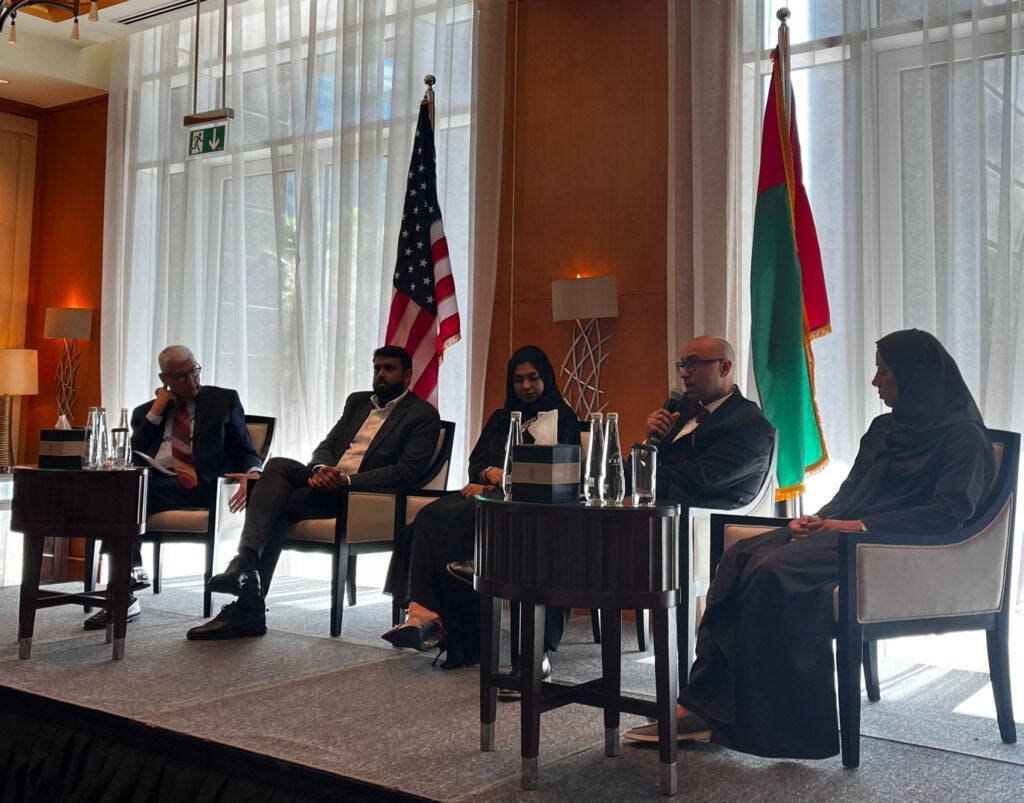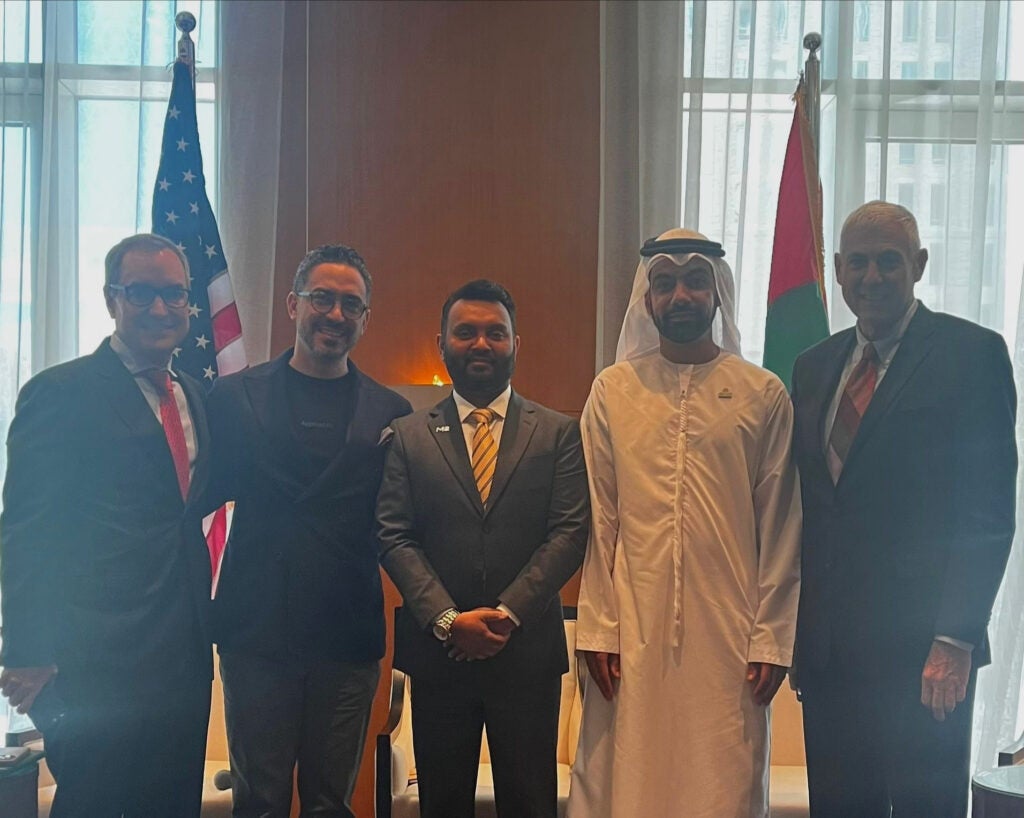
The U.S.-U.A.E. Business Council hosted two workshops with U.A.E. and U.S. healthcare leaders on Wednesday, January 29th on the sidelines of the 50th annual Arab Health Exhibition, taking place in Dubai from January 27-30. These two workshops at the Ritz Carlton DIFC Hotel featured panelists from key U.A.E. healthcare institutions including the Department of Health – Abu Dhabi (DoH), Dubai Health, Dubai Health Authority (DHA), Emirates Drug Establishment (EDE), and M42 and representatives from U.S. and U.A.E. technology and AI companies. U.S. Consul General in Dubai Robert Raines made opening remarks at both sessions, which were attended by senior executives from leading U.S. healthcare institutions participating in Arab Health.
The first workshop titled “AI’s Transformative Impact on Healthcare” featured remarks from Atif Al Braiki, Chief Digital and AI Officer from Dubai Health, Dr. Maaz Shaikh, VP of AI Product Management from M42, Arya Bolurfrushan, CEO of the Applied AI Company, and Dr. Scott Penberthy, Senior Director, Applied AI, Office of the CTO from Google. Panelists provided insights on AI’s influence on healthcare and life sciences in the U.A.E. and around the world.
Dubai Health’s Atif Al Braiki spoke about his organization’s commitment to leveraging digital innovation to enhance healthcare delivery. Dubai Health is training staff in the use of AI across the entirety of its integrated academic health system comprising 6 hospitals, 27 ambulatory health centers, 23 medical fitness centers, Mohammed Bin Rashid University of Medicine and Health Sciences, and Al Jalila Foundation. From his vantage point at an integrated academic health system, Mr. Al Braiki explored the synergy between care, delivery, learning, and AI in the development of healthcare and life sciences. He underscored the importance of AI and healthcare working in tandem to elevate patient care in the U.A.E. and discussed EPIC and 27 use-case AI predictive models utilized by Dubai Health to enhance provision of healthcare and improve health outcomes.
Dr. Maaz Shaikh discussed M42’s groundbreaking work in genomics and AI integration in Abu Dhabi. M42 is an Abu Dhabi-based global health champion powered by AI, technology, and genomics to advance innovation in health. M42 has more than 480 facilities in 26 countries and over 20,000 employees, and operates the Emirati Genome Project and Abu Dhabi BioBank. Dr. Shaikh said a priority for M42 is to ensure that AI is safely implemented across the Abu Dhabi healthcare and life sciences ecosystem to improve quality of care for patients, and support healthcare workers in making informed decisions and reduce administrative work. Dr. Shaikh was optimistic about the tremendous capabilities that AI offers to help scale and enhance genomic research in healthcare and life sciences. Dr. Shaikh explained how M42’s AI technology, such as its Med42 LLM Model, supports hospitals across the U.A.E., specifically citing Cleveland Clinic Abu Dhabi’s utilization of the generative AI LLM to enhance patient care and support healthcare workers.
Arya Bolurfrushan, CEO of the U.A.E. based Applied AI Company, provided insights on private sector initiatives to support public healthcare provision, and outlined future plans for Applied AI Company to radically improve life sciences research in the U.A.E. through its groundbreaking work in advanced technologies in partnership with Palantir. Looking to the future, Mr. Bolurfrushan speculated on the limitless potential of AI to provide unparalleled developments and “democratized excellence” in healthcare and life sciences globally. Noting that around 50% of healthcare professionals’ time globally is spent on non-medical administrative tasks, Mr. Bolurfrushan assessed that the most significant impact of AI in the healthcare and life sciences ecosystem is in easing this administrative burden.
Dr. Scott Penberthy discussed the ways Google is using AI to improve health outcomes through the discovery of new cancer drugs and diagnosis of conditions before they are evident. He spoke of a future in which cancer is a manageable condition, thanks to our ability to understand, debug, and repair the source code to life. Dr. Penberthy explained how AI is transforming biological research in genomics and is cutting costs and enhancing accessibility of healthcare globally. He also spoke about the potential for individually customized therapeutics powered by nanoscale data and analyzed by hyperscale AI. Simply put, Dr. Penberthy argued that AI can “make life easier” in genomics research, and generalized life science research and development.

The second workshop titled “Clinical Trials and R&D in the U.A.E.” featured Dr. Shahrukh Hashmi, Division Director for Medical Research & Development at the Department of Health – Abu Dhabi, Dr. Latifa Alrustamani, Acting Director of Medical Education and Research Development from the DHA, Dr. Khawla Al Mansouri, Standard and Regulations from the EDE, and Dr. Anees Veetil, Clinical Trial Officer also from the EDE. Panelists provided U.S.-U.A.E. Business Council members and attendees valuable insights into the rapid advances of clinical trials, and research and development (R&D) in the U.A.E. healthcare and life sciences ecosystem.
Dr. Shahrukh Hashmi provided insights into the current state of clinical trials and R&D in Abu Dhabi. He explained Abu Dhabi’s desire to implement international best practices in clinical trials and forge new bilateral partnerships. The DoH continues to strengthen medical research in Abu Dhabi through public-private partnerships and has already been working with major U.S. life sciences companies, including U.S.-U.A.E. Business Council members Eli Lilly, Pfizer and MSD. Dr. Hashmi stressed that the DoH will act aggressively to expedite requests and approvals in clinical trials to support the U.A.E.’s ambitions to become a life sciences hub and accelerate the prevention of diseases and the discovery of new cures. The DoH has over 60 proposals under review, and hopes to continue to encourage Phase 1, 2, and 3 clinical trials in the coming years, with an emphasis on cell and gene therapy. With genomic research being a top priority for the DoH, Dr. Hashmi explained that the DoH has already sequenced the DNA of around 750,000 Emiratis and is on track to sequence the DNA of the whole Emirati population by the end of 2025.
Dr. Latifa Alrustamani highlighted the DHA’s efforts to improve and streamline clinical trial regulations, integrate AI and advanced technologies into patient care and R&D, and develop a public health framework for Dubai. Strengthening medical research and empowering clinical research in Dubai are at the forefront of the DHA’s priorities in 2025. Dr. Alrustamani explained that the DHA is hoping to expand on bilateral collaborations in clinical training and medical education and residency programs with U.S. institutions, and is working on industry roundtables later in 2025 to showcase DHA’s programs in this space. DHA’s priorities also include standardizing regulatory compliance for healthcare providers in Dubai. She emphasized initiatives to streamline the use of patient data in healthcare regulations, improving patient experiences and research efficiencies.
Dr. Khawla Al Mansouri and Dr. Anees Veetil provided valuable insights on the ways in which the EDE plans to outline regulatory compliance for pharmaceutical production and distribution. Dr. Al Mansouri reviewed the EDE’s collaborations with federal and emirate level healthcare providers to standardize regulatory frameworks. Both discussed the ongoing work to transfer certain regulatory authorities from the Ministry of Health and Prevention (MOHAP) to the EDE. Dr. Veetil explained the EDE’s efforts to harmonize and streamline regulatory policy and set guidelines to implement advanced technologies in clinical trials. Citing the U.A.E.’s strategic geographic location “at the crossroads of the world,” Dr. Veetil argued that the U.A.E. is uniquely positioned to be a leader in genomic research and advanced gene therapy leveraging its diverse population representative of over 200 countries.
For more information about the U.S.-U.A.E. Business Council’s healthcare and life science programming, please contact Adam Karadsheh at akaradsheh@usuaebusiness.org. To read the 2025 edition of the U.S.-U.A.E. Business Council’s report on U.A.E. Healthcare and Life Sciences Sector, please see here.